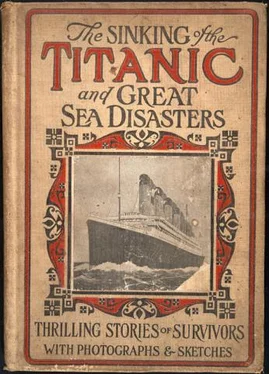Logan Marshall - Sinking of the Titanic and Great Sea Disasters
Здесь есть возможность читать онлайн «Logan Marshall - Sinking of the Titanic and Great Sea Disasters» весь текст электронной книги совершенно бесплатно (целиком полную версию без сокращений). В некоторых случаях можно слушать аудио, скачать через торрент в формате fb2 и присутствует краткое содержание. Год выпуска: 1912, Жанр: Прочая документальная литература, на английском языке. Описание произведения, (предисловие) а так же отзывы посетителей доступны на портале библиотеки ЛибКат.
- Название:Sinking of the Titanic and Great Sea Disasters
- Автор:
- Жанр:
- Год:1912
- ISBN:нет данных
- Рейтинг книги:4.5 / 5. Голосов: 2
-
Избранное:Добавить в избранное
- Отзывы:
-
Ваша оценка:
- 100
- 1
- 2
- 3
- 4
- 5
Sinking of the Titanic and Great Sea Disasters: краткое содержание, описание и аннотация
Предлагаем к чтению аннотацию, описание, краткое содержание или предисловие (зависит от того, что написал сам автор книги «Sinking of the Titanic and Great Sea Disasters»). Если вы не нашли необходимую информацию о книге — напишите в комментариях, мы постараемся отыскать её.
’s demise!
Sinking of the Titanic and Great Sea Disasters — читать онлайн бесплатно полную книгу (весь текст) целиком
Ниже представлен текст книги, разбитый по страницам. Система сохранения места последней прочитанной страницы, позволяет с удобством читать онлайн бесплатно книгу «Sinking of the Titanic and Great Sea Disasters», без необходимости каждый раз заново искать на чём Вы остановились. Поставьте закладку, и сможете в любой момент перейти на страницу, на которой закончили чтение.
Интервал:
Закладка:
“I heard no cries of distress until after the ship went down,” he said.
“How far away were the cries from your life-boat?”
“Several hundred yards, probably, some of them.”
“Describe the screams.”
“Don’t, sir, please! I’d rather not talk about it.”
“I’m sorry to press it, but what was it like? Were the screams spasmodic?”
“It was one long continuous moan.”
The witness said the moans and cries continued an hour.
Those in the life-boats longed to return and pick up some of the poor drowning souls, but they feared this would mean swamping the boats and a further loss of life.
Some of the men tried to sing to keep the women from hearing the cries, and rowed hard to get away from the scene of the wreck, but the memory of those sounds will be one of the things the rescued will find it difficult to forget.
The waiting sufferers kept a lookout for lights, and several times it was shouted that steamers’ lights were seen, but they turned out to be either a light from another boat or a star low down on the horizon. It was hard to keep up hope.
“Let me go back—I want to go back to my husband—I’ll jump from the boat if you don’t,” cried an agonized voice in one life-boat.
“You can do no good by going back—other lives will be lost if you try to do it. Try to calm yourself for the sake of the living. It may be that your husband will be picked up somewhere by one of the fishing boats.”
The woman who pleaded to go back, according to Mrs. Vera Dick, of Calgary, Canada, later tried to throw herself from the life-boat. Mrs. Dick, describing the scenes in the life-boats, said there were half a dozen women in that one boat who tried to commit suicide when they realized that the Titanic had gone down.
“Even in Canada, where we have such clear nights,” said Mrs. Dick, “I have never seen such a clear sky. The stars were very bright and we could see the Titanic plainly, like a great hotel on the water. Floor after floor of the lights went out as we watched. It was horrible, horrible. I can’t bear to think about it. From the distance, as we rowed away, we could hear the band playing ‘Nearer, My God to Thee.’
“Among the life-boats themselves, however, there were scenes just as terrible, perhaps, but to me nothing could outdo the tragic grandeur with which the Titanic went to its death. To realize it, you would have to see the Titanic as I saw it the day we set sail—with the flags flying and the bands playing. Everybody on board was laughing and talking about the Titanic being the biggest and most luxurious boat on the ocean and being unsinkable. To think of it then and to think of it standing out there in the night, wounded to death and gasping for life, is almost too big for the imagination.
“The women on our boat were in nightgowns and bare feet—some of them—and the wealthiest women mingled with the poorest immigrants. One immigrant woman kept shouting: ‘My God, my poor father! He put me in this boat and would not save himself. Oh, why didn’t I die, why didn’t I die? Why can’t I die now?’
“We had to restrain her, else she would have jumped over-board. It was simply awful. Some of the men apparently had said they could row just to get into the boats. We paid no attention to cowardice, however. We were all busy with our own troubles. My heart simply bled for the women who were separated from their husbands.
“The night was frightfully cold, although clear. We had to huddle together to keep warm. Everybody drank sparingly of the water and ate sparingly of the bread. We did not know when we would be saved. Everybody tried to remain cool, except the poor creatures who could think of nothing but their own great loss. Those with the most brains seemed to control themselves best.”
How Mrs. George D. Widener, whose husband and son perished after kissing her good-bye and helping her into one of the boats, rowed when exhausted seamen were on the verge of collapse, was told by Emily Geiger, maid of Mrs. Widener, who was saved with her.
The girl said Mrs. Widener bravely toiled throughout the night and consoled other women who had broken down under the strain.
Mrs. William E. Carter and Mrs. John B. Thayer were in the same life-boat and worked heroically to keep it free from the icy menace. Although Mrs. Thayer’s husband remained aboard the Titanic and sank with it, and although she had no knowledge of the safety of her son until they met, hours later, aboard the Carpathia, Mrs. Thayer bravely labored at the oars throughout the night.
In telling of her experience Mrs. Carter said:
“When I went over the side with my children and got in the boat there were no seamen in it. Then came a few men, but there were oars with no one to use them. The boat had been filled with passengers, and there was nothing else for me to do but to take an oar.
“We could see now that the time of the ship had come. She was sinking, and we were warned by cries from the men above to pull away from the ship quickly. Mrs. Thayer, wife of the vice-president of the Pennsylvania Railroad, was in my boat, and she, too, took an oar.
“It was cold and we had no time to clothe ourselves with warm overcoats. The rowing warmed me. We started to pull away from the ship. We could see the dim outlines of the decks above, but we could not recognize anybody.”
Mrs. William R. Bucknell’s account of the part women played in the rowing is as follows:
“There were thirty-five persons in the boat in which the captain placed me. Three of these were ordinary seamen, supposed to manage the boat, and a steward.
“One of these men seemed to think that we should not start away from the sinking ship until it could be learned whether the other boats would accommodate the rest of the women. He seemed to think that; more could be crowded into ours, if necessary.
“‘I would rather go back and go down with the ship than leave under these circumstances.’ he cried.
“The captain shouted to him to obey orders and to pull for a little light that could just be discerned miles in the distance. I do not know what this little light was. It may have been a passing fishing vessel, which, of course could not know our predicament. Anyway, we never reached it.
“We rowed all night, I took an oar and sat beside the Countess de Rothes. Her maid had an our and so did mine. The air was freezing cold, and it was not long before the only man that appeared to know anything about rowing commenced to complain that his hands were freezing: A woman back of him handed him a shawl from about her shoulders.
“As we rowed we looked back at the lights of the Titanic. There was not a sound from her, only the lights began to get lower and lower, and finally she sank. Then we heard a muffled explosion and a dull roar caused by the great suction of water.
“There was not a drop of water on our boat. The last minute before our boat was launched Captain Smith threw aboard a bag of bread. I took the precaution of taking a good drink of water before we started, so I suffered no inconvenience from thirst.”
Mrs. Lucien Smith, whose young husband perished, was another heroine. It is related by survivors that she took turns at the oars, and then, when the boat was in danger of sinking, stood ready to plug a hole with her finger if the cork stopper became loose.
In another boat Mrs. Cornell and her sister, who had a slight knowledge of rowing, took turns at the oars, as did other women.
The boat in which Mrs. J. J. Brown, of Denver, Col., was saved contained only three men in all, and only one rowed. He was a half-frozen seaman who was tumbled into the boat at the last minute. The woman wrapped him in blankets and set him at an oar to start his blood. The second man was too old to be of any use. The third was a coward.
Читать дальшеИнтервал:
Закладка:
Похожие книги на «Sinking of the Titanic and Great Sea Disasters»
Представляем Вашему вниманию похожие книги на «Sinking of the Titanic and Great Sea Disasters» списком для выбора. Мы отобрали схожую по названию и смыслу литературу в надежде предоставить читателям больше вариантов отыскать новые, интересные, ещё непрочитанные произведения.
Обсуждение, отзывы о книге «Sinking of the Titanic and Great Sea Disasters» и просто собственные мнения читателей. Оставьте ваши комментарии, напишите, что Вы думаете о произведении, его смысле или главных героях. Укажите что конкретно понравилось, а что нет, и почему Вы так считаете.












